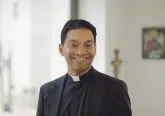The Catholic Moment: Conscience: always right?
Thursday, March 18, 2010
By Father Earl Fernandes
Some years ago, I was at a cookout with some friends and someone said, “Father, you’re Indian but your last name is Fernandes. Why is that?”
I answered that some Indians have Portuguese names because the Portuguese colonized part of India around Goa, and Christian missionaries such as St. Francis Xavier preached and baptized there. I continued that there are many Eastern churches, Catholic and Orthodox, with their own liturgical rites and traditions.
A priest friend at the cookout interjected, “And to which rite do you belong?”
Sensing that I was being set up for a witty one-line zinger, I answered, “I belong to the ‘always rite [sic]’, Father.”
Of course, I am not always right; neither is my conscience. Though we must follow our conscience, it is not infallible. We all make wrong judgments. Just like other operations of our intellect, the judgment of conscience may be objectively wrong. Sometimes this error is our fault. Our degree of blame depends to some extent on whether we have fulfilled our duties of conscience. One duty is to make sure our conscience is properly informed.
Ignorance is one of the main reasons why conscience is sometimes erroneous. There are two types of ignorance: vincible and invincible ignorance. Vincible ignorance occurs when the person can and should overcome the error. A person may recognize or have doubts about a judgment, but through his own fault or neglect, the person does not bother to resolve the doubt or error with ordinary, common diligence. In this case, the person must accept moral responsibility for the error. Invincible ignorance occurs when one is unable morally to overcome an error because he or she has absolutely no awareness or doubt of error. In this case, conscience does not lose its dignity.
The Second Vatican Council, in Gaudium et Spes, (n. 16) says that as intelligent people we have a duty to inform our conscience by seeking the truth: “In fidelity to conscience, Christians are joined with other people in the search for truth, and for the genuine solution to the numerous problems which arise in the life of individuals from social relationships. Hence the more right conscience holds sway, the more persons and groups turn aside from blind choice and strive to be guided by the objective norms of morality. Conscience frequently errs from invincible ignorance without losing its dignity. The same cannot be said for a person who cares but little for truth and goodness, or for a conscience which by degrees grows practically sightless as a result of habitual sin.”
Conscience is intimately connected to truth. If we do not seek truth, or fail to exercise ordinary diligence in seeking it, we may make errors in judgment and sin. We draw nearer to the truth by informing our conscience through Scripture, tradition, the wisdom of the moral community, by our reasoned investigation and our own experience in life and relationships.
In addition to these means for making a right judgment, a person can pray for the gifts of the Holy Spirit, especially for prudence, and seek the advice of experts. Further, a person could follow a few basic maxims: one may never do evil that good may come from it; do unto others as you would have them do unto you; true charity respects our neighbor and his or her conscience.
Finally, when our conscience is clear of doubt, in obedience to the truth, we must follow the dictates of conscience, where the voice of God “echoes in the depths” of our being.
Father Fernandes is an assistant professor of moral theology and dean of Mount St. Mary’s Seminary.













